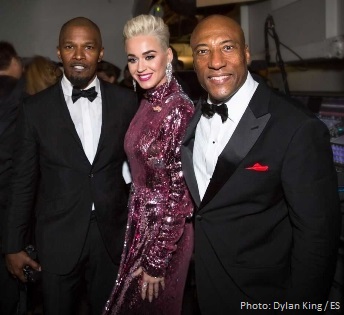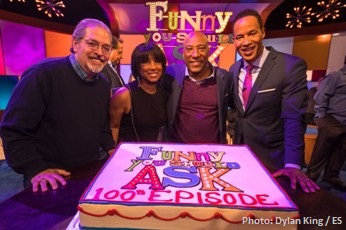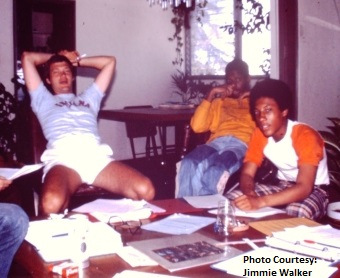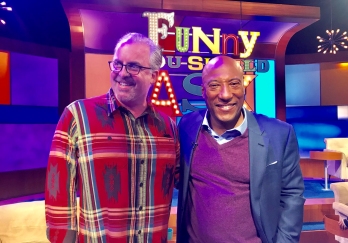TV Writers Vault founder and
producer Scott Manville spent the
day with media titan Byron Allen to
discover that in Allen's high-octane
world of creating and selling TV
series, acquiring motion pictures
for distribution, and purchasing
cable networks (Byron Allen recently
made a strategic purchase of The
Weather Channel for $300 Million)...
Family
still comes first. We share
with you Scott's time spent at
Entertainment Studios on their 100th
episode taping of "
Funny You
Should Ask".
By
Scott Manville
Comedian Byron Allen warms up the TV studio audience
with disarming comedy, finding the funny as the
minutes count down to showtime. But this isnt circa
70s The Tonight Show- Its the 100th episode of
Allens syndicated hit comedy game show
Funny
You Should Ask. And while Allen is now a
billion-dollar media titan as founder, chairman and
CEO of Entertainment Studios, he lives true to his
heart with the same wide-eyed passion for punchlines
as he had writing jokes for Jimmie Walker as a
teenager for twenty-five bucks a pop. Those roots of
his success are still being watered, and the fruit
has come to fruition with Allen having created the
largest privately held TV program library in the
world, along with acquiring for theatrical and
digital distribution hand-picked hit movies that
have come to bear with the critically acclaimed
Christian Bale epic,
Hostiles, the summer
hit
47 Meters Down, and the upcoming
April release of historical thriller
Chappaquiddick.

Inside Entertainment Studios Culver City
soundstage, with lights, cameras, and a flurry of
action, Byron Allen moves briskly on set to produce
5 new episodes of "Funny You Should Ask" for the
day, with a focus that is the reason and rhyme for
his success. One of his stage-hands mops the floor
to a shine and catches the ear of a busy Allen
moving across set. Allen stops and commits all of his
attention and focus to the man holding the mop, as
if he's listening to one of his own executives, or
one of his own children. He listens, he confirms, he
listens some more, and he encourages him with a pat
on the shoulder. It's this type of respect and
attention he gives to those around him that fosters
a cohesive spirit of pride among his employees and
executives- Something not often found on set or in
companies today.
This is a family.

As taping begins, Allen does double duty producing
from his chair on the panel while serving up clever
quips and one-liners alongside other icons of
comedy, including Louie Anderson, Jon Lovitz, Sherri
Shepherd, and Billy Gardell. Today/s fourth episode
will be the 100th of the series, and the pace only
slows for a brief lunch at craft services where
Allen sits amongst his crew, with his mother,
Executive Producer and Entertainment Studios
Co-Founder, Carolyn Folks, at his side.
I'm introduced to the showrunner of the series,
Executive Producer, Scott Satin, who's a walking
testament to Allen's eye for talent after
discovering Satin submitting Jokes for The Byron
Allen Show in 1988 while washing cars for Dick
Clark. Today, thirty years later, the two describe
one another like brothers, still collaborating and
creating comedy day in and day out for
Funny
You Should Ask. He reflects on the show's
hybrid format of comedy and game- "
On that first
episode we shot, none of the comedians knew what we
were filming- if they were going to look good or
bad. They were scared- as they should be. We had to
convince them to just trust us, and we'll create and
produce the show to bring the best out of them. It
was just like a first date. They had no idea what
they were getting into, but then right after that
first break, they knew there was something special.
On the synergy he has with Byron after decades of
producing comedy together, he turns sentimental, "
We're
very like-minded. We literally could have been
brothers, both personally and professionally. He's a
stand-up comedian, so what comes out of his mouth on
stage is very personal to him. Being able to write
for him- I feel such pride."
"He
understands what
happens between New
York and L.A.
He knows what is the
heart of America" |
TV game show guru Bob Boden, who joined the show
as season one began a year ago, sheds light on
Allen's midas touch, and his belief that "
Funny
You Should Ask" will become a generational
success. "
Byron is the next great game show
mogul. He's already that many times over in
different fields, but he really didn't tackle game
shows until about a year ago with this format. He's
connected to the viewers and public in a way that
I've rarely experienced in my career. He understands
what happens between New York and L.A. He knows what
is the heart of America. He knows that humor,
especially in the times we're living in, is a very
important element as a draw for any entertainment
vehicle, but particularly a game show. I think this
show can run forever.
Allen's President of Domestic Television
Distribution, Andrew Temple, sets a clear
perspective on the studios plight and agenda in this
new era of television; "
Our industry is in
desperate need of an overhaul, and the opportunity
is very clear. If we are to see a renaissance in
broadcasting it is going to come from an independent
studio like ours, because we have the fire in our
gut to make it happen. It's in our DNA. Every hit
that our industry has ever had came from an
independent. Unfortunately, our industry right now
is too focused on the deal,and not the show, and the
audience simply doesn't care about deals, they want
exceptional content. Netflix, Hulu and Amazon are
taking our lunch money because they are focused on
producing quality entertainment. Entertainment
Studios is a content factory and we are making the
investment into the successful future of broadcast
television."
Things are gearing up for episode 100 as I follow
Allen and his Executive VP Eric Peterkofsky toward
set. We duck into a space out of the limelight that
awaits, as cheers and laughter erupt from the
audience getting warmed up.
|
"For me,
it was an
unbelievable front
row seat...I
remember sitting
there as a kid
watching them, and
that's when I had
the epiphany- I knew
what I wanted to do
with my life..." |
Scott Manville:
I have to tell
you first, meeting your team...the overwhelming
feeling I have is- this is a family. Especially
meeting your mother and family here on set. When
you look at your career-you started young. You've
been through so many stages, as a performer, on
camera, behind the camera...when we look at the
scope of your business success now...what was the
turning point? Any event or person that was a
catalyst to you being able to see the potential of
what has now come to fruition?
Byron Allen:
Wow- A number of
catalysts have been along the way. But, you
know...My mother- getting into UCLA film school.
Going to UCLA, working on her masters in cinema TV
production. That was a big breakthrough. It was a
major breakthrough. That opened the door to her
being an intern at NBC, and then a tour guide, and
then a publicist at NBC. And then me going with her
and being exposed to what was going on at NBC in the
70s which was just magical. I was a young kid, 12
years old, and I was able to see Johnny Carson do
The Tonight Show, Flip Wilson do his show, Redd Foxx
do Sanford & Son, Freddie Prinze do Chico & The Man.
Being able to go to NBC and watch Bryant Gumbel do
the local news as a sportscaster, or Pat Sajak do
the weather on KNBC. To watch them do Days Of Our
Lives, or to see Bob Hope or George Burns do their
television specials. I watched all of these shows in
person, A to Z. I watched Merv Griffin produce Wheel
of Fortune. I watched sitcoms, news, gameshows,
variety shows, talk shows. For me, it was an
unbelievable front row seat, watching how the best
television shows were produced. I remember sitting
there as a kid, watching them, and that's when I had
the epiphany- I knew what I wanted to do with my
life- which was be a comedian, make people laugh,
write, produce, make television, make movies.
|
"In
Jimmie's apartment,
what nobody knew at
the time... it was
the future of
comedy." |
 So I started right then and there. I started
performing at the Comedy Store in the summer of 75.
I was 14 years old. Shortly after starting at the
Comedy Store I was spotted by a guy named Wayne
Kline, who was a comedian and writer- he asked me if
I wrote my material and he knew somebody who might
like my material, and so I gave him my phone number,
and then Jimmie Walker called and asked me to come
and hang out with his writing staff. So Im at
Jimmie's apartment, and there's David Letterman who
had just come out from Indianapolis in a red pickup
truck, and Jay Leno who was sleeping in his car-
they were gettin two hundred bucks a week, and I
was getting twenty-five dollars a joke. And David
Letterman drove out in his pickup truck 'cause he
didnt think he was going to make it and wanted to
be able to get in his truck and drive home. In
Jimmie's apartment, what nobody knew at the time...
it was the future of comedy.
So I started right then and there. I started
performing at the Comedy Store in the summer of 75.
I was 14 years old. Shortly after starting at the
Comedy Store I was spotted by a guy named Wayne
Kline, who was a comedian and writer- he asked me if
I wrote my material and he knew somebody who might
like my material, and so I gave him my phone number,
and then Jimmie Walker called and asked me to come
and hang out with his writing staff. So Im at
Jimmie's apartment, and there's David Letterman who
had just come out from Indianapolis in a red pickup
truck, and Jay Leno who was sleeping in his car-
they were gettin two hundred bucks a week, and I
was getting twenty-five dollars a joke. And David
Letterman drove out in his pickup truck 'cause he
didnt think he was going to make it and wanted to
be able to get in his truck and drive home. In
Jimmie's apartment, what nobody knew at the time...
it was the future of comedy.
I went on, and I did the Tonight Show with Johnny
Carson, I was eighteen and it was two weeks before I
graduated from high school. It went well and I got a
number of offers. The one that attracted me the most
was the one that was different from all of the other
66 hours of prime-time television- at that point
there were only three networks; ABC, NBC, CBS. So I
said "I want this one, Real People". It was a
reality show, and ended up being the grand-daddy of
all the reality shows. From there, I saw America,
and really got a better sense of America going all
over the country doing stories for Real People in
the smallest, smallest towns. I then went all over
America opening for people as a comedian, as an
opening act for Lionel Richie, Kenny Rogers, Dolly
Parton, Whitney Houston, Al Jarreau, Sammy Davis
Jr., Lou Rawls, The Pointer Sisters, Gladys Knight,
Patti Labelle, Paul Anka. There were very few people
I didn't open for. So I just went- anywhere from
Disneyland to Carnegie Hall. But the turning point
for me was going to my very first NATPE
A producer on set interjects- �
We�re ready for
you, Sir!�, as the audience and notables are
waiting for his 100th episode to begin.
Allen continues, �
My very first NATPE was in
January of 1981...and that�s where I met my mentor,
Al Masini. I watched him there, selling a pilot with
the biggest movie star in the world on it, Burt
Reynolds on set of Smokey & The Bandit, and that
pilot is what became Entertainment Tonight. I
introduced myself to Al Masini, and he became like a
second father to me. I was 19, and I�ve attended
every NATPE every year since 1981. I just completed
my 37th. So with 37 years of going to NATPE, I�ve
gotten to know all of these people who own and
operate all of the TV stations, and all the people
who run the ad agencies and operate the budgets.
NATPE changed the trajectory of my career, and
opened up a parallel that�s very unique because I
was able to open up, for all of those thirty-seven
years, relationships, trust, and bonds to create and
produce forty-one shows directly with all of those
TV stations. And it�s putting those forty-one shows
on the air, and building my syndication company at
my dining room table, starting with one show, that
has put me in a position to get into the movie
business.�
SM: �
That�s what I find so
fascinating. My former boss, Merv Griffin- he was a maverick too in
syndication- in his time. You�ve taken it to a new
level. That�s what impresses me most. You create and
produce your own programs, fueling broader success,
with films like �Hostiles�, tackling the independent
film arena. Can you briefly explain what your
creative strategy was, to create your original
programs and bring them to market?-Those shows that
have fueled Entertainment Studios.�
BA: �
You know... my mentor Al Masini said as a
kid he loved radio...so he took the radio shows that
he had heard and made them into TV shows. So, Hedda
Hopper became Entertainment Tonight, Hit Parade
became Solid Gold. I took the magazine stand and
converted them into TV shows. And he always said to
watch TV, figure out what�s not there, and then put
it there. So I watched closely, saw what was
missing, and started to think about what I wanted to
see there. Then I started creating and placing shows
there. Once you have a direct relationship with TV
stations� all of the TV stations, and all the
advertisers, then you can put one on, and another,
another, another. Then the next thing you know��
SM: �
You do business.�
BA: �
Exactly. We�re one of the
largest privately held television libraries in the
world, and now our growing movie division is an
important asset of our global media company.�
The show must go on, and as Louie Anderson passes us
cheering �
100!� and another producer yells
�
Let�s do it!�, Allen motions to the set
and heads toward the lights to do what he does
best...entertain, and make the people laugh.
|
"We
need more laughter.
We need more
love..." |
At episode end, Allen is joined by his wife and
children, while a cake fit for a king (and a crew!)
is rolled out center stage. He speaks from his
heart; "
There is not enough laughter in the
world. There is not enough love. We need more
laughter. We need more love. My wife, my best
friend- she always said to me, "Byron, you have
strong instincts, never stop believing in your
instincts."
And with that, Byron Allen wastes no time sharing
more laughter, and spreading the love...announcing
on the spot- "
Funny You Should Ask will be on
until the end of time. We've just given it an
additional order of four hundred and twenty
episodes!"
Byron continues by roasting his old friend, saying
he created the shows format so Scott Satin could
have something to do." Satin ponders the news of four
hundred and twenty more episodes ordered; "
I'm
trying to wrap my mind around this. That's.how many
punchlines?" Every episode has 21 jokes. For the
hundred we've done, that's 2100 jokes! But to get
there, you have to do 10 to 1, so that was 21,000
jokes! With 400 episodes...(laughing)...I better say
I love a challenge. Yes! It's the challenge we love!�
 Scott
Manville
Scott
Manville founded TVWritersVault.com
creating the first industry marketplace online to
deliver shows from new creators to global broadcast
on major cable networks, including;
Lifetime TV(U.S./U.K.) Discovery Channel, A&E(U.S.,
Australia), SyFy (U.S., U.K.), UKTV,
Foxtel and
others. Manville has served as Producer at
Relativity Television and is a former head of
development for Merv Griffin Entertainment.


 Inside Entertainment Studios Culver City
soundstage, with lights, cameras, and a flurry of
action, Byron Allen moves briskly on set to produce
5 new episodes of "Funny You Should Ask" for the
day, with a focus that is the reason and rhyme for
his success. One of his stage-hands mops the floor
to a shine and catches the ear of a busy Allen
moving across set. Allen stops and commits all of his
attention and focus to the man holding the mop, as
if he's listening to one of his own executives, or
one of his own children. He listens, he confirms, he
listens some more, and he encourages him with a pat
on the shoulder. It's this type of respect and
attention he gives to those around him that fosters
a cohesive spirit of pride among his employees and
executives- Something not often found on set or in
companies today. This is a family.
Inside Entertainment Studios Culver City
soundstage, with lights, cameras, and a flurry of
action, Byron Allen moves briskly on set to produce
5 new episodes of "Funny You Should Ask" for the
day, with a focus that is the reason and rhyme for
his success. One of his stage-hands mops the floor
to a shine and catches the ear of a busy Allen
moving across set. Allen stops and commits all of his
attention and focus to the man holding the mop, as
if he's listening to one of his own executives, or
one of his own children. He listens, he confirms, he
listens some more, and he encourages him with a pat
on the shoulder. It's this type of respect and
attention he gives to those around him that fosters
a cohesive spirit of pride among his employees and
executives- Something not often found on set or in
companies today. This is a family. As taping begins, Allen does double duty producing
from his chair on the panel while serving up clever
quips and one-liners alongside other icons of
comedy, including Louie Anderson, Jon Lovitz, Sherri
Shepherd, and Billy Gardell. Today/s fourth episode
will be the 100th of the series, and the pace only
slows for a brief lunch at craft services where
Allen sits amongst his crew, with his mother,
Executive Producer and Entertainment Studios
Co-Founder, Carolyn Folks, at his side.
As taping begins, Allen does double duty producing
from his chair on the panel while serving up clever
quips and one-liners alongside other icons of
comedy, including Louie Anderson, Jon Lovitz, Sherri
Shepherd, and Billy Gardell. Today/s fourth episode
will be the 100th of the series, and the pace only
slows for a brief lunch at craft services where
Allen sits amongst his crew, with his mother,
Executive Producer and Entertainment Studios
Co-Founder, Carolyn Folks, at his side.  So I started right then and there. I started
performing at the Comedy Store in the summer of 75.
I was 14 years old. Shortly after starting at the
Comedy Store I was spotted by a guy named Wayne
Kline, who was a comedian and writer- he asked me if
I wrote my material and he knew somebody who might
like my material, and so I gave him my phone number,
and then Jimmie Walker called and asked me to come
and hang out with his writing staff. So Im at
Jimmie's apartment, and there's David Letterman who
had just come out from Indianapolis in a red pickup
truck, and Jay Leno who was sleeping in his car-
they were gettin two hundred bucks a week, and I
was getting twenty-five dollars a joke. And David
Letterman drove out in his pickup truck 'cause he
didnt think he was going to make it and wanted to
be able to get in his truck and drive home. In
Jimmie's apartment, what nobody knew at the time...
it was the future of comedy.
So I started right then and there. I started
performing at the Comedy Store in the summer of 75.
I was 14 years old. Shortly after starting at the
Comedy Store I was spotted by a guy named Wayne
Kline, who was a comedian and writer- he asked me if
I wrote my material and he knew somebody who might
like my material, and so I gave him my phone number,
and then Jimmie Walker called and asked me to come
and hang out with his writing staff. So Im at
Jimmie's apartment, and there's David Letterman who
had just come out from Indianapolis in a red pickup
truck, and Jay Leno who was sleeping in his car-
they were gettin two hundred bucks a week, and I
was getting twenty-five dollars a joke. And David
Letterman drove out in his pickup truck 'cause he
didnt think he was going to make it and wanted to
be able to get in his truck and drive home. In
Jimmie's apartment, what nobody knew at the time...
it was the future of comedy.  Scott
Manville founded TVWritersVault.com
creating the first industry marketplace online to
deliver shows from new creators to global broadcast
on major cable networks, including;
Lifetime TV(U.S./U.K.) Discovery Channel, A&E(U.S.,
Australia), SyFy (U.S., U.K.), UKTV,
Foxtel and
others. Manville has served as Producer at
Relativity Television and is a former head of
development for Merv Griffin Entertainment.
Scott
Manville founded TVWritersVault.com
creating the first industry marketplace online to
deliver shows from new creators to global broadcast
on major cable networks, including;
Lifetime TV(U.S./U.K.) Discovery Channel, A&E(U.S.,
Australia), SyFy (U.S., U.K.), UKTV,
Foxtel and
others. Manville has served as Producer at
Relativity Television and is a former head of
development for Merv Griffin Entertainment.